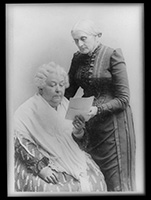Elizabeth Stanton and The Women's Bible

Elizabeth Cady Stanton, born in 1815, was one of the most prominent women's rights activists of the nineteenth century. Although she did not live to see universal suffrage become reality as she died in 1902, Stanton spend most of her adult life in its construction. She was a speechwriter for her close friend, Susan B. Anthony, who ironically became famous for delivering the ideas and words that Stanton herself created. [1] In 1869 Stanton and Anthony together formed the National Woman Suffrage Association. After Stanton's death, her daughter Harriot became very involved in the cause of championing women's rights.
In 1895 Stanton and a committee of interested women produced The Women's Bible. [2] The committee was not composed of theologians or scriptural historians but of women's right activists like Stanton herself. In 1888 the Church of England had published its King James Version of the Bible. Stanton and her followers were unimpressed with the new translation and applied all of their political zeal this new cause. Taking matters into their own hands, the group resolved to rewrite the scriptures with the aim of emphasizing the important roles of the women within them.
During her life, Stanton had felt keenly the pain of gender discrimination. While studying as a child at the co-educational Johnston Academy, she had been the only girl in the upper mathematics and language classes. [3] Despite this, after graduation she was barred from attending college because of her gender. She enrolled in the only other course available to her, which was studying at a female seminary. Sometimes Stanton and her father, a judge, studied the law together although they both realized that she would never be permitted to practice it on her own.
Later in her life, Stanton became interested in Theosophy, a religion dedicated to combining many components of both Eastern and Western truth into one universal religion. The faith emphasized the personal spiritual experiences of its followers, including mystic experiences such as reincarnation and karma. Possessed of a religious orientation open to all possible forms of truth, Stanton unsurprisingly undertook to rewrite the Bible on behalf of and for those whom she saw as "made silent" by contemporary society: women.
The following commentary on Genesis appears in The Women's Bible: "As the account of the creation in the first chapter is in harmony with science, common sense, and the experience of mankind in natural laws, the inquiry naturally arises, why should there be two contradictory accounts in the same book, of the same event? Is it fair to infer that the second version, which is found in some form in the different religions of all nations, is a mere allegory, symbolizing some mysterious conception of a highly imaginative editor. The first account dignifies woman as an important factor in the creation, equal in power and glory with man. The second makes her a mere afterthought. The worlds in good running order without her. The only reason for her advent being the solitude of man. Thus, the Old Testament 'in the beginning,' proclaims the simultaneous creation of man and woman, the eternity and equality of sex; and the New Testament echoes back through the centuries the individual sovereignty of woman growing out of this natural fact." [4]
Stanton published her work in 1895. Unfortunately, the public did not receive it well, and consequently it was never widely circulated. What follow are two editorials that Peattie wrote on the subject of The Women's Bible, one which appeared before the new scripture's completion, and another which was written after the work had been first released to society.
Read Peattie's Writings
References
"America's Story: Elizabeth Cady Stanton." http://www.americaslibrary.gov/cgi-bin/page.cgi/aa/activists/stanton/women_1.
"Elizabeth Cady Stanton: 1895" http://www.nps.gov/archive/wori/ecs.htm accessed October 6, 2007.
"Comments on Genesis: Elizabeth Cady Stanton. http://womenshistory.about.com/library/etext/blwomansbible02a1.htm accessed October 6, 2007.
The Women's Bible, 1895/1898, Chapter II: Comments on Genesis, pp. 20-21. http://womenshistory.about.com/library/etext/blwomansbible02a1.htm accessed October 6, 2007.
Illustrations
"Elizabeth Cady Stanton, seated, and Susan B. Anthony, standing, three-quarter length portrait." Library of Congress Digital id #: cph 3a02558. http://hdl.loc.pnp/cph.3a025558
Notes
XML: ep.owh.rel.0005.xml
